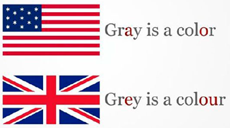 1) –or and –our
1) –or and –our
British English tends to use -our in adjectives,whereas American English uses -or:
For example: colour (UK) and color (US); neighbour (UK) and neighbor (US)
2) –er and –re
Some noun endings are -re in British English, but -er in American English:
For example: centre (UK) and center (US)
3) – ice and –ise
Some words have -ice ending for the noun and -ise ending for the verb in British English. For example: practice (noun) and to practise (verb). However, in American English both noun and verb are spelled practice.
4) –l and –ll
In British English, when a word ends in a single consonant, it is doubled when we add a suffix beginning with a vowel:
For example: traveller; levelled
However, in American English the 'l' is not doubled:
For example: traveler, levelled
5) Other common words
British English and American English have different spellings for certain words:
For example: cheque (GB) - check (US); programme (GB) – program (US)




